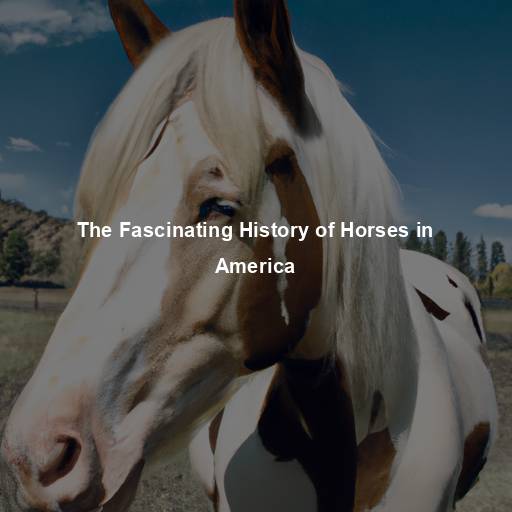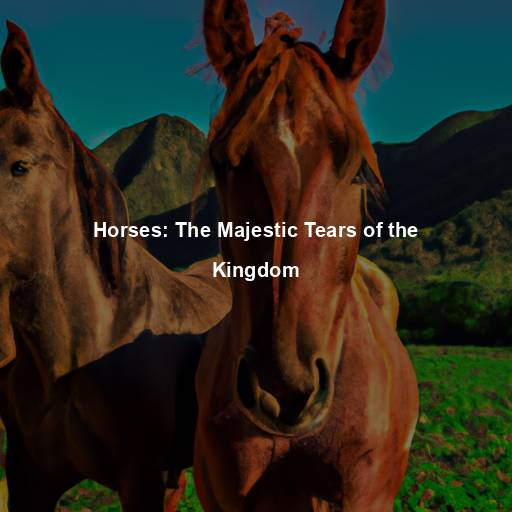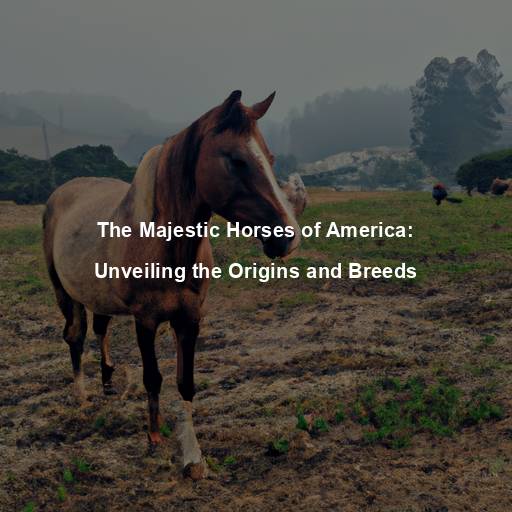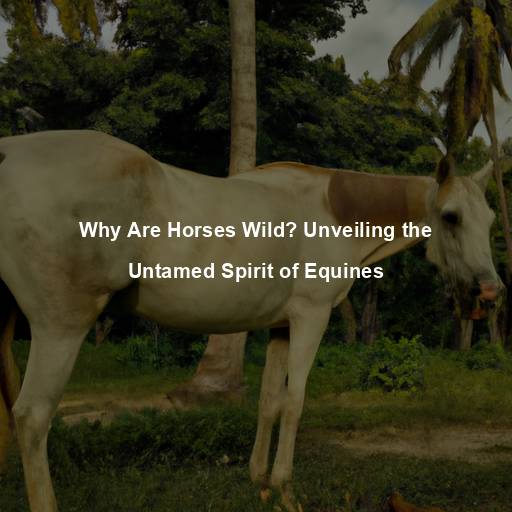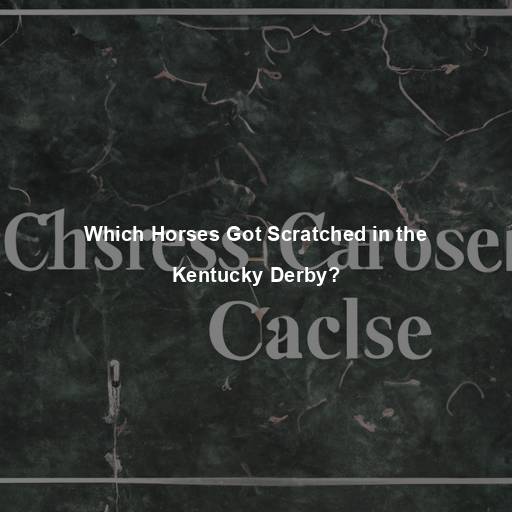The Fascinating History of Horses in America
Last Updated on October 28, 2023 by Evan
Contents
- 1 The Arrival of Horses on American Soil
- 2 The Origins of Horses in America
- 3 The Impact of Horses on Native American Cultures
- 4 The Impact of Horses on American Expansion
- 5 The Legacy of Horses in America
- 6 Horses in Therapy and Assistance Programs
- 7 Horses in Popular Culture and Media
- 8 The Future of Horses in America
- 9 The Evolution of Horse Breeds in America
- 10 The Importance of Horse Care and Welfare
- 11 Final Thoughts
- 12 FAQs: Where Did Horses Come From in America?
- 12.1 Q: Where did horses originally come from before they were in America?
- 12.2 Q: How did horses arrive in America during the 15th century?
- 12.3 Q: Why did horses become extinct in North America before being reintroduced?
- 12.4 Q: Did Native Americans have horses before they were reintroduced by the Spanish?
- 12.5 Q: Did all Native American tribes use horses?
- 12.6 Q: Are the wild mustangs in America descended from the original horses that arrived with the Spanish?
The Arrival of Horses on American Soil
The Native American Perspective
The history of horses in America is a captivating tale that dates back thousands of years. Before the arrival of Europeans, horses were not native to America. Their introduction to the continent is a remarkable story of exploration, conquest, and transformation. To truly understand the significance of horses in America, we must first delve into their origins.
The Origins of Horses in America
The Evolutionary Journey
Throughout millennia, the captivating story of horses has unfurled, painting a picture of our intricate coexistence. These incredible creatures, whose evolutionary journey dates back millions of years, first harnessed their potential on the vast plains of North America. Yet, amidst the labyrinth of time, an enigma emerges: around 10,000 years ago, the once-mighty horses vanished from their ancestral homeland, leaving us pondering the perplexing circumstances surrounding their disappearance, a riddle that continues to bewilder and astound.
The Spanish Conquest
Fast forward to the 15th century when Spanish explorers set sail on their grand expeditions. It was during one of these voyages that horses were reintroduced to the Americas. In 1493, Christopher Columbus brought a small herd of horses to the Caribbean islands on his second voyage. This marked the beginning of a new chapter in the history of horses in America.
The Impact of Horses on Native American Cultures
A Game-Changer
Horses quickly became a game-changer for the Native American tribes. The introduction of horses revolutionized their way of life, transforming them into skilled equestrians and skilled hunters. The tribes quickly adapted to this newfound relationship with horses, forming an unbreakable bond that would shape their future.
The Plains Tribes and the Horse Culture
The majestic Plains tribes wholeheartedly embraced the captivating allure of the horse culture, immersing themselves in its enigmatic essence. Through the great expanse of the land, the Comanche, Sioux, Cheyenne, and countless others became revered for their unparalleled mastery of horsemanship. The ethereal bond between the tribes and these enigmatic creatures transformed their existence, granting them a newfound efficiency in hunting the mighty buffalo, an ability to traverse vast distances with grace, and a formidable edge in the tempestuous realm of intertribal warfare.
The Impact of Horses on American Expansion
The Role of Horses in Exploration
As European settlers began their westward expansion, horses played a crucial role in exploration. They facilitated the discovery of vast territories, opening up new frontiers for settlement. Explorers and pioneers relied heavily on horses for transportation, allowing them to traverse long distances and overcome geographical obstacles.
The Pony Express and the Wild West
In the captivating era of the mid-19th century, an emblematic chapter unfolded, birthing the Pony Express. This fabled mail delivery system unfolded against a backdrop of boundless possibilities; where horses galloped across sprawling landscapes, stitching the East Coast and an untamed West together. As whispers of its existence spread like wildfire, the Pony Express emerged as a mythical embodiment of the Wild West, intertwining fantasy and reality in the collective consciousness of a global audience.
The Legacy of Horses in America
A National Icon
Throughout the annals of American history, one cannot deny the profound influence that horses have imprinted upon our culture. They have become living symbols of boundless freedom, boundless adventure, and the boundless frontiers that define our nation. Whether it be the fearless cowboys traversing the vast prairies or the electric atmosphere that reverberates through racetracks, these majestic creatures never fail to bewitch our souls with their enigmatic allure.
The Preservation of Horse Breeds
Today, various horse breeds exist in America, each with its own unique characteristics and history. Organizations such as the American Quarter Horse Association and the American Paint Horse Association work tirelessly to preserve and promote these breeds. Through selective breeding and careful preservation efforts, these organizations ensure that the legacy of horses in America lives on.
Equestrian Sports and Competitions
Horses have played a significant role in shaping American sports and recreation. Equestrian sports, such as show jumping, dressage, and eventing, have gained widespread popularity. These competitions showcase the extraordinary bond between horse and rider, as they navigate challenging courses and perform intricate movements with grace and precision. Equestrian events, like the Kentucky Derby and the Rolex Grand Slam of Show Jumping, draw spectators from around the world, highlighting the enduring fascination with horses in the realm of sports.
Rodeos and Western Traditions
Rodeos, deeply rooted in the traditions of the American West, celebrate the skills of cowboys and cowgirls in various events such as bull riding, roping, and barrel racing. These thrilling spectacles capture the essence of horsemanship and the spirit of the Wild West. Rodeos provide a platform for showcasing the bravery, agility, and teamwork between horses and riders, keeping alive the rich heritage of the American frontier.
Horses in Therapy and Assistance Programs
Equine-Assisted Therapy
Horses have long been more than just graceful creatures roaming the fields. Their incredible versatility has extended to the realm of therapy and assistance programs, where they have been found to be invaluable. Equine-assisted therapy, with its rising recognition, has revolutionized how we approach physical, cognitive, and emotional disabilities. It’s astonishing how interacting with these majestic animals can create such a profound impact, promoting emotional well-being, enhancing motor skills, and cultivating a powerful sense of connection and empathy.
Therapeutic Riding Programs
Experience the transformative power of horse-assisted therapy, where rhythmic horseback riding activities offer a profound therapy experience. Discover the amazing benefits as individuals with disabilities embark on a journey towards enhanced core strength, coordination, and balance. These therapeutic riding programs provide an invaluable opportunity for personal growth, instilling confidence and resilience to overcome life’s obstacles, ultimately enriching one’s quality of life. Join us in exploring the remarkable world of hippotherapy and witness the magic unfold.
Horses in Popular Culture and Media
Horses in Literature and Film
Throughout the ages, horses have woven themselves into the tapestry of human artistry, captivating our hearts and stirring our souls. From the elegant pages of literature to the silver screen of cinema, these majestic beings have left an indelible mark on our collective imagination. Whether it be the timeless tale of Black Beauty or the riveting journey of a mysterious stallion in War Horse, horses have seamlessly transformed into symbols of emancipation, unwavering devotion, and unwavering strength. With every flicker of their presence, they ignite within us an exquisite blend of awe, affinity, and empathy, fostering an inexplicable connection that transcends the mundane confines of our reality.
Horses in Art and Music
The beauty and grace of horses have inspired artists throughout history. Paintings, sculptures, and photographs featuring horses can be found in galleries and museums worldwide. Equine art showcases the intricate details of their muscular form, their elegance in motion, and the profound connection between horse and rider. Additionally, horses have been a recurring theme in music, with songs like “Wild Horses” by The Rolling Stones and “Horse with No Name” by America, further highlighting their cultural significance.
The Future of Horses in America
Equine Welfare and Conservation Efforts
In a rapidly evolving society, the significance of safeguarding horses and preserving their welfare cannot be overstated. Across the country, tireless organizations ardently champion equine well-being, sparing no effort to shield these majestic creatures from the clutches of abuse, neglect, and exploitation. Through a myriad of educational initiatives, compassionate rescue missions, and unrelenting advocacy, these dedicated groups embark on a collective mission to forge a brighter, more compassionate future for horses in the United States. Their unwavering commitment shines a light on the path towards equine preservation, fostering a harmonious coexistence between humans and these noble beings.
Preserving Equestrian Traditions
From the thundering hooves that echo through time to the elegant dance between horse and rider, the essence of equestrian traditions holds secrets of an untamed past. With fervent dedication, we must rally behind riding schools, youth programs, and fierce competitions, intertwining our destiny with these majestic creatures. Embracing the art of horsemanship, we shield the legacy of noble steeds by championing ethical breeding practices and nurturing an unwavering adoration for these enchanting equine beings. For in their grace and power lies the future of horses in America, a future pulsating with equestrian fervor.
The Evolution of Horse Breeds in America
American Breeds
Over the centuries, horses in America have evolved into distinct breeds, each with its own unique characteristics and qualities. American breeds, such as the American Quarter Horse, the Morgan, and the Tennessee Walking Horse, have gained recognition for their versatility, athleticism, and adaptability to various disciplines.
The American Quarter Horse
The American Quarter Horse, known for its speed and agility, has become the most popular breed in the United States. Originally bred for short-distance races, this versatile breed excels in Western riding, ranch work, and rodeo events. With its muscular build, quick acceleration, and docile nature, the American Quarter Horse has captured the hearts of riders and enthusiasts alike.
The Morgan Horse
The Morgan horse, one of the oldest horse breeds in America, is renowned for its elegance, intelligence, and versatility. Developed in the late 18th century, this breed played a significant role in the development of various other American horse breeds. Morgans excel in a wide range of disciplines, including driving, dressage, and trail riding, making them a popular choice for riders seeking a well-rounded and dependable partner.
The Tennessee Walking Horse
The Tennessee Walking Horse is famous for its unique four-beat running walk gait, known as the “Big Lick”. This breed’s smooth and comfortable gait makes it highly sought after for pleasure riding and trail work. With its gentle disposition and natural athleticism, the Tennessee Walking Horse has become a beloved breed among enthusiasts who appreciate its smooth ride and distinctive movement.
The Importance of Horse Care and Welfare
Responsible Horse Ownership
Ensuring the well-being and proper care of horses is paramount. Responsible horse ownership entails providing appropriate nutrition, regular veterinary care, and access to clean water and shelter. Additionally, horses require regular exercise, grooming, and attention to their emotional well-being. By prioritizing their welfare, we can ensure that horses lead healthy, happy lives.
Equine Nutrition and Health
Ensuring the impeccable well-being of our noble four-legged companions demands a meticulous balancing act of nutritional excellence. Few can doubt the vital role of a carefully curated diet, where the amalgamation of high-quality forage, grains, and specialized supplements tailored to each horse’s unique requirements is nothing short of paramount. By adhering to a diligent schedule of veterinary check-ups, vaccinations, and deworming, we embark on a tangible journey of proactive disease prevention and early detection, granting us unprecedented peace of mind. Let us not overlook the very pillars of Equine wellness – regular dental care, hoof maintenance, and the all-encompassing art of proper grooming – ultimately amplifying their boundless vitality and enchanting spirit.
Ethical Breeding Practices
The art of breeding horses is an intricate tapestry woven with ethics and responsibility, with breeders acting as the guardians of their noble lineage. These skilled individuals embrace a mission to carefully curate bloodlines that radiate health and embody coveted traits. By conscientiously selecting specimens of robust constitution and favorable temperaments, breeders embark on a journey to elevate the very essence of the breed, all while sidestepping the treacherous pitfalls of genetic disorders and championing the cause of genetic diversity. Moreover, they diligently endeavor to orchestrate seamless transitions, uniting their precious foals with caring and knowledgeable protectors of the equine kingdom.
Challenges and Conservation Efforts
The future of horses in America faces certain challenges, including urbanization, changing societal attitudes, and environmental concerns. As cities expand and land becomes scarce, preserving spaces for horses to live and graze becomes increasingly important. Conservation efforts that protect natural habitats and promote responsible land management are crucial for ensuring the sustainability of horse populations.
Educating the Next Generation
Educating the next generation about horses and their significance is vital for their continued well-being and appreciation. Equine education programs, riding schools, and youth organizations play a pivotal role in teaching proper horsemanship, responsible ownership, and the value of the human-horse bond. By instilling a love and respect for horses in young minds, we pave the way for a future where horses continue to be cherished and protected.
Final Thoughts
For centuries, horses have galloped through the tapestry of American history, leaving hoofprints that intertwine with tales of exploration, culture, and harmony between man and beast. From the moment European explorers reintroduced these noble creatures to the New World to the symbiotic relationship forged with Native American communities, the influence of horses on American society is nothing short of awe-inspiring. As we peer into the uncertain horizon of the future, it becomes imperative to safeguard their storied legacy, advocate for responsible horse care, and champion their well-being. By doing so, we ensure that the remarkable bond between humans and these majestic creatures endures, gracefully reminding us of the inexplicable connection that unites us all.
FAQs: Where Did Horses Come From in America?
Q: Where did horses originally come from before they were in America?
Did you know that horses, majestic creatures that they are, actually originated right here in North America? Yes, you heard that right! Around 55 million years ago, these marvelous beings roamed our land, until, to our great perplexity, they mysteriously vanished about 10,000 years ago. However, just when we thought we had bid them farewell forever, they burst back onto the scene in the Americas during the 15th century, thanks to the arrival of those daring Spanish explorers and conquistadors. History truly has a way of leaving us in awe and wonder, doesn’t it?
Q: How did horses arrive in America during the 15th century?
A: Horses were reintroduced to America during the 15th century primarily through the Spanish expeditions led by explorers like Christopher Columbus, Hernán Cortés, and Francisco Pizarro. The Spanish brought horses from Spain to aid in their exploration, colonization, and conquest efforts.
Q: Why did horses become extinct in North America before being reintroduced?
B: The riddle of the vanished equines in North America is a tapestry woven with various threads of hypothesis and uncertainty. Historians and biologists have spun theories aplenty, pointing to the capricious hands of climate change, the relentless hunting prowess of early human settlers, and the cutthroat competition with other plant-munching creatures as potential culprits in this cataclysmic disappearance. For countless millennia, the absence of these majestic creatures has allowed Mother Nature’s canvas to be painted with strokes of evolution untainted by equine hoofprints.
Q: Did Native Americans have horses before they were reintroduced by the Spanish?
A: No, Native Americans did not have horses before their reintroduction by the Spanish. When horses were reintroduced to the Americas, Native American tribes quickly adopted and incorporated them into their cultures. Horses provided significant benefits such as transportation, hunting, and warfare capabilities, leading to profound changes in their way of life.
Q: Did all Native American tribes use horses?
The vast tapestry of Native American tribes is rich with diversity, and the intricate relationship between these communities and horses tells a captivating tale. While not all tribes embraced the equine companionship, an astonishing number eagerly embraced this transformative alliance, developing an expertise in horsemanship that earned them legendary status. The Plains Indians, with tribes like the Sioux, Cheyenne, and Comanche, stand as luminous examples of their deep-rooted connection with these majestic creatures. However, for other tribes nestled in the eastern woodlands, the diffusion of horses was thwarted, due to a tapestry intricately woven with geographical and cultural nuances, leaving them with limited access to this remarkable partnership.
Q: Are the wild mustangs in America descended from the original horses that arrived with the Spanish?
A: It is believed that the wild mustangs found in America today are indeed descendants of the original horses brought by the Spanish. Over the centuries, some of the horses escaped or were released, and through natural selection and adaptation, they formed feral populations that still roam parts of North America, primarily in the western states.

